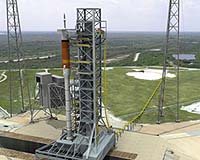 |
Cape Canaveral, Florida (AFP) Oct 27, 2009 NASA has delayed until Wednesday attempts to test a prototype rocket designed to return astronauts to the Moon, and perhaps one day send them to Mars. After a series of delays due to the weather, the launch of the Ares I-X from Cape Canaveral in Florida was abandoned for the day and officials said they would try again in a four-hour window from 8:00 am (1200 GMT) Wednesday. "Overall, the weather will improve," a NASA official said after Tuesday's efforts were called off. The Ares I-X is the prototype for the Ares I, a booster vehicle intended to launch mission crews into orbit in the Orion spacecraft, which is still under development. NASA hopes to have the Ares in service by 2015, which would still leave a five-year gap in its human spaceflight program as its aging space shuttle fleet is due to be mothballed next year. During the two-minute test flight NASA aims to gather data from more than 700 sensors placed along the rocket that should enable engineers to fine-tune their design. Fifteen stories taller than the shuttle, the 327-foot (100-meter) Ares is the longest rocket ever built. Ares and Orion are part of Constellation, NASA's grand program to send astronauts back to the Moon by 2020, and then on to Mars and other destinations. The test flight is crucial as the White House is considering a report ordered by President Barack Obama's administration that raises concerns about Ares and the whole Constellation project. A commission, chaired by Norman Augustine, a former executive at aerospace giant Lockheed Martin, concluded that the program "appears to be on an unsustainable trajectory" and seeks to achieve goals not matched by resources. The Ares rocket has suffered major development problems and its hefty price tag has fueled criticism of NASA, an agency notorious for its cost overruns. The initial budget for the Constellation program was set at 28 billion dollars, but has swollen to at least 44 billion. Ed Crawley, a member of the Augustine commission set up by Obama to review the space plans of his predecessor George W. Bush, said that Ares I was "not the right ship" for post-shuttle space flight. "The question is not can we build Ares I, but should we build Ares I," Crawley said. But Doug Cooke, associate administrator of NASA's Exploration Systems Mission Directorate, was upbeat ahead of the launch. "This test is very important," he told reporters last week. "The data is important to us, regardless of what comes next." If lift-off goes ahead on Wednesday it would be the first time in 30 years that the Kennedy Space Center has launched anything other than a shuttle. If weather again delays the test flight, the team has a four-hour launch window each day until Friday. NASA's yearly budget is about 18 billion dollars, 10 billion of which is plowed into the human space flight program, chiefly in developing the Ares I rocket and the Orion Crew Exploration Vehicle. The Augustine Commission said an additional three billion dollars a year are needed for NASA to meet Constellation program goals or take human space flight the next step beyond the existing International Space Station (ISS). Share This Article With Planet Earth
Related Links Rocket Science News at Space-Travel.Com
 NASA is 'go' for crucial rocket test
NASA is 'go' for crucial rocket testWashington (AFP) Oct 25, 2009 NASA is set to blast off a prototype rocket on Tuesday that carries hopes of returning humans to the Moon, and for the first time to Mars, despite deep uncertainty about the program's future. The space agency said everything is in order for Tuesday's two-minute, 30-second test of the Ares I-X rocket, a first look at the launch vehicle designed to replace NASA's aging space shuttle fleet. ... read more |
|
| The content herein, unless otherwise known to be public domain, are Copyright 1995-2009 - SpaceDaily. AFP and UPI Wire Stories are copyright Agence France-Presse and United Press International. ESA Portal Reports are copyright European Space Agency. All NASA sourced material is public domain. Additional copyrights may apply in whole or part to other bona fide parties. Advertising does not imply endorsement,agreement or approval of any opinions, statements or information provided by SpaceDaily on any Web page published or hosted by SpaceDaily. Privacy Statement |